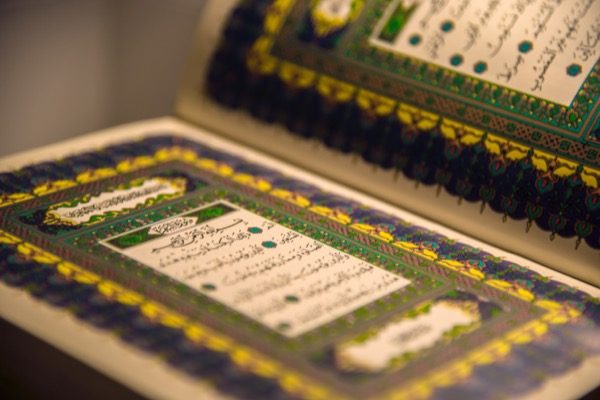Discussing three attributes of God found in the opening verses & the lexical analysis of the final three verses of Sūrah al-Nās.
Tag - Al-Tafsir Al-Kabir
Seeking refuge from evils of different levels of society, in light of the verses of Sūrah al-Nās.
Commentary on Sūrah al-Nās, the last chapter of the Holy Qur’an begins.
One of the causes of decline was discussed in وَمِنْ شَرِّ النَّفَّاثَاتِ فِي الْعُقَدِ, which explained that nations are ruined when they fall into...
وَمِنْ شَرِّ حَاسِدٍ إِذَا حَسَدَ And also from the mischief of every persistently envious person. (6) Key Word Analysis of Wa...
As already explained in the lexical analysis, العَقْدُ signifies الوَلَايَةُ عَلَى البَلَدِ that is, the governance, rule and authority of...
وَمِنْ شَرِّ النَّفَّاثَاتِ فِي الْعُقَدِ And to save me from the mischief of all those who blow upon the knots of mutual...
It has previously been explained in the commentary of قُلْ أَعُوذُ بِرَبِّ الْفَلَقِ * مِنْ شَرِّ مَا خَلَقَ (Qul A‘ūdhu bi Rabb al-Falaq min...
وَمِنْ شَرِّ غَاسِقٍ إِذَا وَقَبَ And to be protected against all the mischiefs of the one that causes darkness when it overspreads. Key Word...
Sūrah (Chapter) al-Falaq and Sūrah (Chapter) al-Nās are also referred to as al-Mu‘awwidhatān,i.e. those chapters...
ο قُلْ أَعُوذُ بِرَبِّ اَلْفَلَقِ ο مِنْ شَرِّ مَا خَلَقَ We enjoin Muslims of all times that you continuously proclaim...
As previously mentioned in the commentary on Sūrah al-Ikhlāṣ, the final three chapters are collectively a summary of the Holy As previously mentioned in the...
Commentators say that the verse: وَلَمۡ يَكُن لَّهُۥ كُفُوًا أَحَدُۢ (wa lam yakun lahū kufuwan aḥad) is placed here to reiterate and emphasise the...
وَلَمۡ يَكُن لَّهُۥ كُفُوًا أَحَد And He [Allah] has no partner (with respect to His attributes). Key Word Analysis كُفُوًا (Kufuwan) الْکُفُؤُ (al...
لَمۡ يَلِدۡ وَلَمۡ يُولَدۡ Allah begets not, nor is He begotten (4) Commentary In the first verse of Sūrah al-Ikhlāṣ, قُلۡ هُوَ ٱللَّهُ أَحَدٌ, the...
ٱللَّهُ ٱلصَّمَدُ[Allah al-Ṣamad] – Ṣamad refers to that Being Who does not depend on anything or anyone else, but all things are dependent...
للّٰهُ الصَّمَدُ Allah is the Being upon Whom everyone is dependent (but Who is not reliant on anyone) Key Word Analysis الصَّمَدُ: السَّيِّدُ...
Commentary of Qul Huwallāhu Aḥad As already explained in the commentary of Sūrah al-Lahab [the previous chapter], the Holy Qur’an’s subject...
هُوَ – huwa [He]: Huwa is an إ سْمُ ضَميرٍ [ism ḍamīr]; that is, huwa is a singular, masculine, third...
There are three types of narrations pertaining to the occasions and circumstances of revelation of this Sūrah. The first narration is that the polytheists of...
The Holy Prophet (sa) has declared this chapter to be one-third of the Qur’an. Thus, he has stated: ِ”مَنْ قرَأَ قُلْ هُوَ اللّٰهُ أَحَدٌ...
A number of names have been cited for this chapter in various commentaries of the Holy Qur’an. These numerous names are indicative of the vast nature of its...
سُورَةُ الاِخْلَاصِ مَكِّيَّةٌ وَهِيَ خَمْسُ آيَاتٍ مَعَ البَسْمَلَةِ Sūrah al-Ikhlāṣ is Makkan and including Bismillah, it has 5 verses. (1) According to Ibn...
The Review of Religions is delighted to present the complete English translation of the commentary of Sūrah al-Ikhlāṣ – Chapter 112 of the Holy Qur’an – by...
Commentary of the final verse of Sūrah al-Falaq is presented in this edition.
Commentary of Verse 5 of Sūrah al-Falaq from The Holy Quran.
In this edition, commentary of verse 4 of Sūrah al-Falaq begins.
The lexical analysis of the word ghāsiq from chapter 113 of the Holy Qur’an.
In the previous edition, the reason for Allah using the command ‘Say’ in chapter 112 of the Holy Qur’an was explained. In this edition, we...
© Shutterstock In the previous edition, we examined the various aspects of creation mentioned in the opening verses of Sūrah al-Falaq. In this edition, the...










